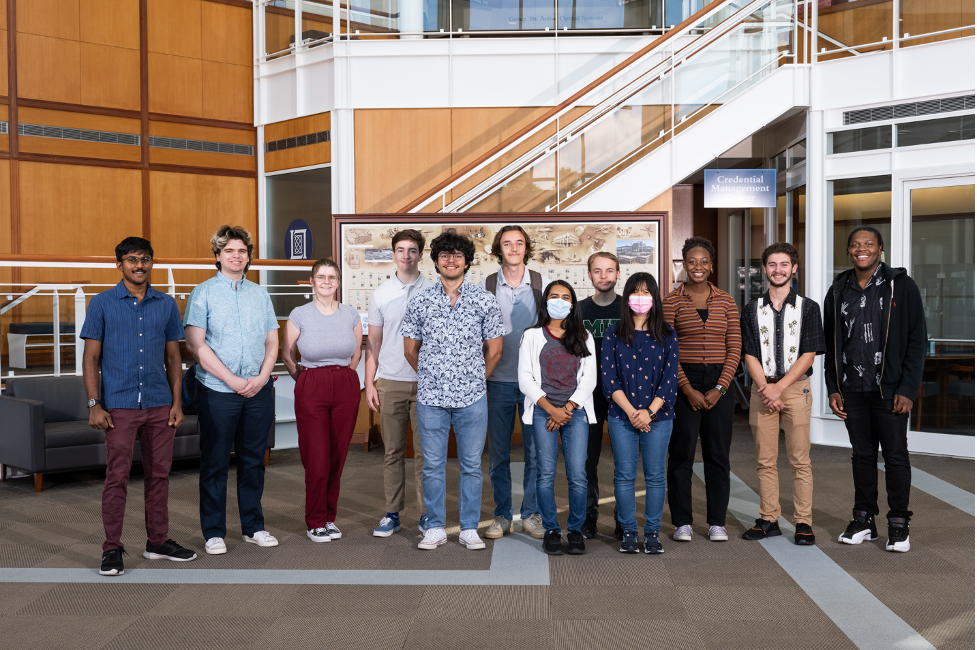Massachusetts Microelectronics Internship Program: a big focus on critical tiny components
 MMIP students during a visit to MIT Lincoln Laboratory this summer. Photo credit: Nicole Fandel, MIT Lincoln Laboratory.
MMIP students during a visit to MIT Lincoln Laboratory this summer. Photo credit: Nicole Fandel, MIT Lincoln Laboratory. Jane Halpern | Department of Electrical Engineering and Computer Science
One of the most critical components of our technological future is easy to overlook. Microelectronics, the devices and circuits at the core of computer and communication chips, are aptly named: built on the micrometer (and nanometer!) scale, they cannot be seen with the naked eye, but they power almost everything around us from smart watches, cell phones, or computers, to electric vehicles and the sophisticated tools used in DNA sequencing and drug discovery. Although many times we take them for granted, the pandemic and the supply chain issues that it has fostered have highlighted how critical these tiny electronic building blocks are. Unfortunately, although microelectronics got started in the U.S., production of microelectronics chips in the U.S. in the last 30 years has lagged behind that of other countries, creating a critical shortage of national capability in research, development and manufacturing.
The Massachusetts Microelectronics Internship Program (MMIP) is trying to change that. Designed by a coalition of universities, private companies, and state governmental organizations, the new initiative was launched over the summer to connect undergraduates interested in learning more about microelectronics with industry.
“We understand that it’s sometimes difficult for first-years and sophomores to find internship opportunities in this fast-moving highly-technical field,” says Tomás Palacios, Professor of Electrical Engineering and Industry Officer at MIT EECS Alliance, one of the program’s sponsors. “We want to fix that and make sure that anyone interested in hardware and the exciting field of semiconductors and electronics has internship opportunities from the very beginning, so we created this program.”
Open to all freshmen and sophomores registered at Massachusetts universities, the MMIP offers a ten-week, full-time internship opportunity in microelectronics and hardware—with no prior experience required. The program includes training modules, mentor support, and network-building events designed to help students find their way in a burgeoning industry.
“The Commonwealth of Massachusetts has prioritized internships, mentorships, and apprenticeships as a critical way to get students interested in tech and innovation careers,” says Christine Nolan, Director of the Center for Advanced Manufacturing at the MassTech Collaborative, a state economic development agency that sponsors the program. “Through this effort, we’re directly addressing the talent gap that exists within microelectronics and hardware, by introducing the career opportunities early-on in the student’s college experience and doing so through hands-on training. By making these paid positions, we’re also recognizing the challenges around equity and economic opportunity, allowing any interested student to get a foothold in this industry.”
The potential impact that these students can have in the world is nearly limitless; as computing transforms industries, the demand for the hardware that makes this possible (i.e., semiconductors and microelectronics) continues to grow.
“The semiconductor industry forms the foundation of the digital revolution that is shaping the future of economies, and indeed, the future of humanity and our planet as well,” says Vincent Roche, CEO of program sponsor Analog Devices (ADI). “The foundation of the semiconductor industry, though, is the incredible people bringing its innovations to life. ADI is excited to be a founding member of the Massachusetts Microelectronics Internship Program. This program is a unique opportunity for students just beginning their careers to grow their network, work hand-in-hand with their peers and industry experts on the technologies that are shaping our future, and gain the real-world skills and knowledge that will empower them to become our industry’s next generation of leaders.”
This summer, in the program’s very first season, a cohort of 20 freshmen and sophomore students from different Massachusetts universities and colleges were selected out of approximately hundred applicants, and spent the summer interning at different Massachusetts microelectronics companies. They received personalized mentorship and participated in a variety of training events and visits to microelectronics companies such as Raytheon Technologies, MITRE and Lincoln Laboratory, where they had an opportunity to learn about semiconductor fabrication, enter a cleanroom facility where some of the most advanced chips for satellites are made, and try to hack modern microelectronics chips.
“Workforce is one of the most essential elements in reasserting U.S. leadership in microelectronics, which is why we believe participating in the new Massachusetts Microelectronics Internship Program is so important,” says Robert Atkins, Head of the Advanced Technology Division at Lincoln Laboratory, another one of the MMIP’s sponsoring organizations. “We are blessed to have significant microelectronics fabrication facilities here at Lincoln Laboratory, and while those facilities are critical to our research, they also provide a wonderful learning environment. Our hope is to use this setting to engage students, motivating them to pursue careers in microelectronics.”
The application process for the second class of the MMIP is just starting, and the application deadline is October 15th. As the program develops and grows, more students around all of Massachusetts and the nation will discover how they too can play a key role in the hardware that drives computing, energy, communications and health, even as freshmen and sophomores.
WEBSITES RELATED TO THIS ANNOUNCEMENT
MMIP Program website and application site: https://www.ma-microelectronics.org/
The Role of Universities in Reasserting US Leadership in Microelectronics: https://usmicroelectronics.mit.edu/
Massachusetts Technology Collaborative: https://masstech.org/
Media Inquiries
Journalists seeking information about EECS, or interviews with EECS faculty members, should email eecs-communications@mit.edu.
Please note: The EECS Communications Office only handles media inquiries related to MIT’s Department of Electrical Engineering & Computer Science. Please visit other school, department, laboratory, or center websites to locate their dedicated media-relations teams.